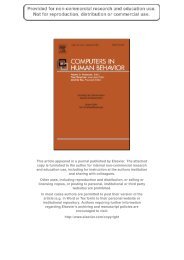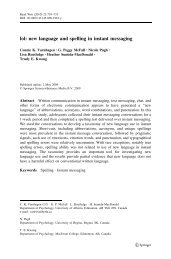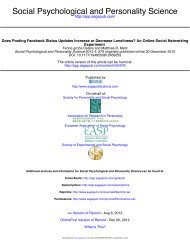Six Models for the Internet + Politics
Create successful ePaper yourself
Turn your PDF publications into a flip-book with our unique Google optimized e-Paper software.
Archon Fung, Hollie Russon Gilman, and Jennifer Shkabatur 45<br />
racy—will be relatively uncommon (but not completely absent). We think that<br />
three more incremental contributions of ICTs to democratic governance—truthbased<br />
advocacy, constituent mobilization, and social monitoring—will become<br />
increasingly impactful because <strong>the</strong>se uses of digital technologies amplify <strong>the</strong><br />
ef<strong>for</strong>ts of organizations and individuals to achieve <strong>the</strong> aims that <strong>the</strong>y already<br />
have. That is, <strong>the</strong> last three models are compatible with existing incentives and<br />
institutional constraints.<br />
Like many o<strong>the</strong>rs who have offered prognostications about <strong>the</strong> <strong>Internet</strong> and<br />
politics, we are probably wrong in our predictions about <strong>the</strong> fate of <strong>the</strong> six models<br />
above, and we are probably wrong <strong>for</strong> reasons that we cannot even imagine<br />
from this particular point in time. The conclusions that we offer about each of<br />
<strong>the</strong>se models are thus offered as sensible but speculative, not definitive or<br />
dispositive.<br />
However, we hope that our more durable contribution to discussions of <strong>the</strong><br />
role of <strong>the</strong> digital communication technologies in politics is to encourage<br />
each of <strong>the</strong> two “sides” of this debate—<strong>the</strong> starry-eyed technologists and <strong>the</strong><br />
hard-headed political analysts—to take <strong>the</strong> o<strong>the</strong>r more seriously. To <strong>the</strong> political<br />
analysts, <strong>the</strong>re is something different about communication, organization,<br />
production, and action in <strong>the</strong> digital era. 25 The new ICTs do enable new<br />
kinds of exchange and collaboration that are significant <strong>for</strong> politics. To <strong>the</strong><br />
technologists, <strong>the</strong>se magical new plat<strong>for</strong>ms and possibilities exert <strong>the</strong> effects<br />
<strong>the</strong>y have against a thick background of organizations, institutions, and political<br />
actors. The way to understand <strong>the</strong> effect of technology on politics is not<br />
to generalize or analogize from one or o<strong>the</strong>r digital plat<strong>for</strong>m—such as <strong>the</strong> collaborative<br />
production of knowledge on Wikipedia—but ra<strong>the</strong>r to understand<br />
some digital technology as a part and an intervention in a larger political<br />
system.<br />
The six schematic models developed above create a vernacular with which to<br />
consider points of technological intervention and a larger political system.<br />
We hope that o<strong>the</strong>rs will take up <strong>the</strong>se models, and <strong>the</strong> hypo<strong>the</strong>ses that we offer<br />
about <strong>the</strong>m to show how we are wrong or incomplete. These models are all models<br />
of politics within a domestic political system—national, provincial, or local.<br />
These models are obviously not appropriate <strong>for</strong> those who are interested in<br />
o<strong>the</strong>r kinds of politics—transnational politics or <strong>the</strong> politics of governing multinational<br />
corporations. Extending this approach to those kinds of cases would<br />
entail first sketching some broader account of how political <strong>for</strong>ces in those<br />
domains operate absent digital technology, and <strong>the</strong>n reasoning about <strong>the</strong> character<br />
and effects of some technological intervention on that much larger political<br />
system.<br />
References<br />
Baiocchi, Gianpaolo, Partick Heller, and Mareclo Silva. (2011) Bootstrapping Democracy:<br />
Trans<strong>for</strong>ming Local Governance and Civil Society in Brazil. Stan<strong>for</strong>d: Stan<strong>for</strong>d University Press.<br />
Barber, Benjamin. (1984) Strong Democracy: Participatory <strong>Politics</strong> <strong>for</strong> a New Age. Berkeley, CA: University<br />
of Cali<strong>for</strong>nia Press.<br />
Benkler, Yochai. (2006) The Wealth of Networks: How Social Production Trans<strong>for</strong>ms Markets and Freedom.<br />
New Haven, CT: Yale University Press.<br />
Benkler, Yochai. (2011) A Free Irresponsible Press: Wikileaks and <strong>the</strong> Battle over <strong>the</strong> Soul of <strong>the</strong><br />
Networked Fourth Estate. Harvard Civil Rights-Civil Liberties Law Review 46: 311–397.<br />
Bimber, Bruce. (2003) In<strong>for</strong>mation and American Democracy: Technology in <strong>the</strong> Evolution of Political Power.<br />
Cambridge, UK: Cambridge University Press.<br />
Chadwick, Andrew. (2006) <strong>Internet</strong> <strong>Politics</strong>: States, Citizens, and New Communication Technologies. New<br />
York and Ox<strong>for</strong>d: Ox<strong>for</strong>d University Press.<br />
25 See e.g., Karpf (2012) <strong>for</strong> a related argument in <strong>the</strong> context of online political mobilization.
















